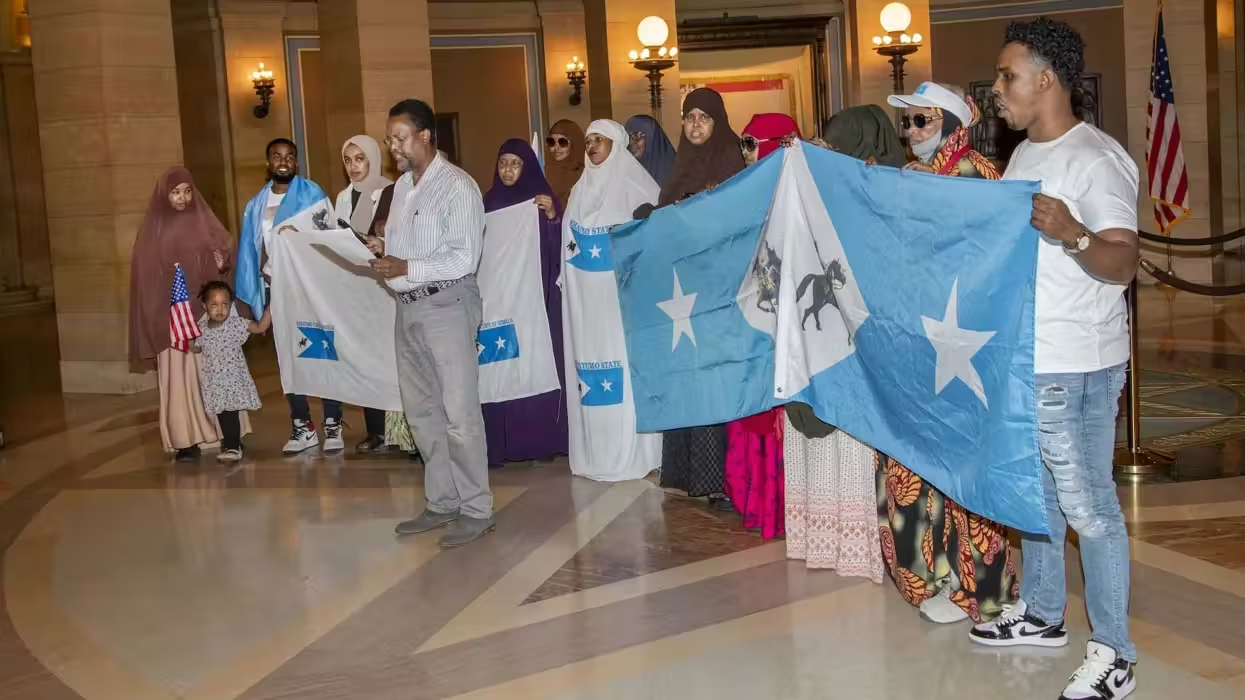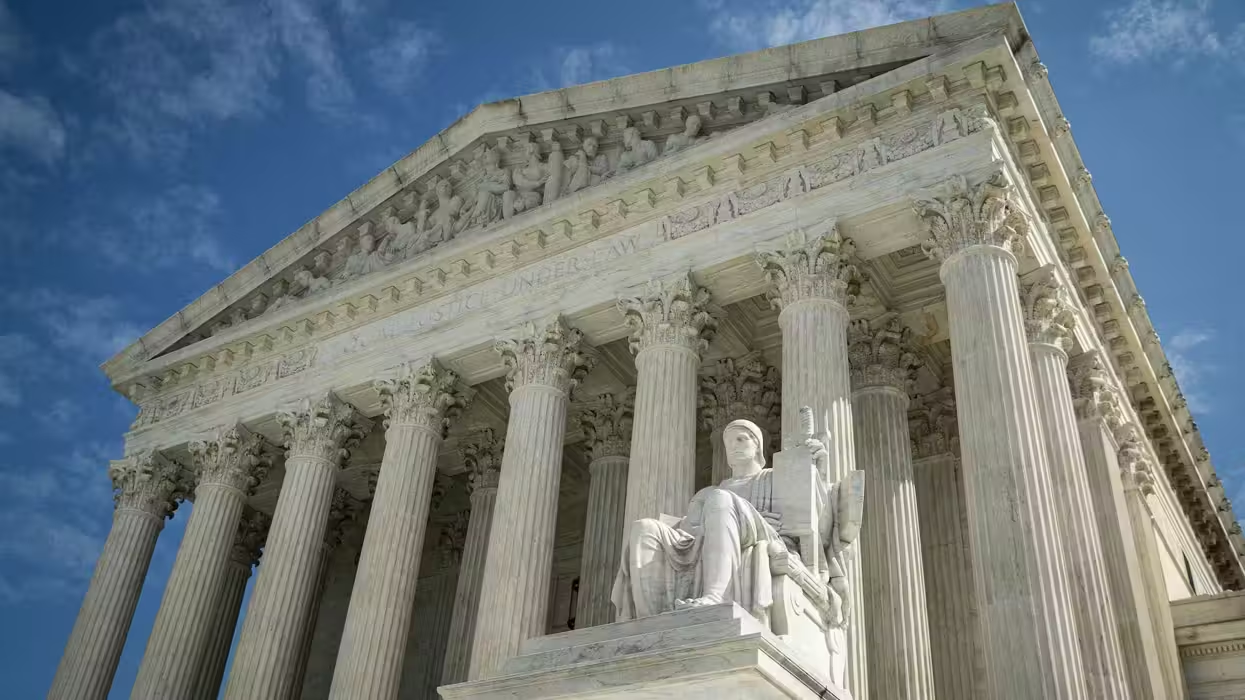
© 2025 Blaze Media LLC. All rights reserved.
Why there has 'been no more benevolent occupation' than that of Israel: A remarkable passage from the '70s that could have been written today
August 05, 2014
Nothing new under the sun.
Recently we wrote about the history of the Israeli-Arab conflict that the mainstream media would never print -- providing some context for the current conflict between the Arabs of Gaza and Israel.
Today we excerpt another passage from Shmuel Katz's "Battleground: Fact & Fantasy in Palestine," first published in 1973, in which the late South African native who emigrated to Israel in the 1930s, served in the Irgun and later held a seat in Israel’s First Knesset argues that the Israeli "occupation" of Judea, Samaria and Gaza after the 1967 War is the most "benevolent" of all.
 Bulldozers constructing a new neighborhood in Ariel in the West Bank on September 27, 2010. (Image Source: Getty/CNN.com)
Bulldozers constructing a new neighborhood in Ariel in the West Bank on September 27, 2010. (Image Source: Getty/CNN.com)
The most striking aspects of Katz's passage -- reflecting the historical media bias against Israel, and the pains to which Israel has historically gone to protect civilians -- in light of the current Israeli-Arab conflict, are bolded for emphasis.
There has probably been no more benevolent occupation than the Israeli government of the Arab population of Judea and Samaria and Gaza. There have inevitably been punitive measures to put a stop to disturbances of the peace and to acts of violence.
In May 1976, in the wake of the Arab states’ triumphant induction of the ‘Palestine Liberation Organization’ into the halls of international intercourse, and with Israel visibly hard-pressed, from without by a United States seeking Arab favor and from within by economic and social problems, young Arabs, long subject to persistent and exhilarant incitement did indeed riot in the towns of Judea and Samaria. Stone throwing crowds threatened heavily outnumbered Israeli security forces. In these clashes, one Arab was killed on each of a number of successive days. The event of an Arab being killed by Israeli security forces was so unusual that each single death evoked headlines, for example, in The New York Times. Thus, on a day when that newspaper buried the killing in one day alone in Lebanon, of 150 people and the wounding of 600 in two casual lines in the depths of a story from Beirut, it published a headline on its front page, and repeated it over four columns on an inside page, announcing: "Israeli Soldiers Kill Arab Youth on West Bank."
[instory-book ISBN="9780929093130"]
But in the nine years of Israeli rule, there has not been one execution. A handful of Arabs have been kept in administrative detention. In some cases, where an Arab has preached violence against Israel, he has been banished across the Jordan, where he is of course free to continue to preach and even to practice violence. The most serious punishment meted out to those who have given shelter to terrorists has been the destruction of their houses after due warning.
That sums up the measures taken by the Israeli government to preserve law and order in the areas she governs. Where in the history of our times has there been such another occupation over a frankly hostile conquered population?
That is not all. The Israeli government has also gone to great lengths, probably unprecedented in the history of military occupations, both to create an easy and relaxed relationship with the people and to improve their lot. From the beginning, it established the principle of not interfering with the tenor and manner of fife of the Arab population, with only two exceptions. First it insisted on the correction or replacement of school texts containing political propaganda–that is, the anti-Israel and anti-Semitic demonology and crude justifications of genocide with which the textbooks abounded. The second exception consisted in a considerable expenditure of money and effort and expertise to improve the economic condition of the population. Special teams were sent to instruct Arabic farmers in modem methods and the use of modem equipment in agriculture. Loans were granted for the erection of new industrial plants and the extension and improvement of existing plants.
Israel has opened vocational training centers to raise as many young Arabs as possible out of the rut of unskilled work. Moreover, she opened the gates to Arab workers from Judea, Samaria, and Gaza. By 1972, forty thousand workers from their towns and villages traveled to work every morning to Israeli building sites and factories. In addition to buying a part of their agricultural crop herself, Israel, in spite of the hostile activities against her beyond the Jordan, allows the Arabs in western Palestine to send their products for sale across the river.
The result has been the elimination of unemployment, both among the "regular" population and among the refugees still living in camps – most of the latter in the Gaza area, where they had been kept deliberately in squalor and idleness by the Egyptians. A sharp [rise] in the standard of living has followed and a widening of the economic horizons of the whole Arabic community in western Palestine.
The Israeli government has been at special pains to ensure the maintenance of the cultural and even the social links of the Arabs of Palestine with other parts of the Arab nation. In spite of the Arabs’ failure to honor the cease fire of terrorist infiltration and attempts at infiltration, of the campaign of incitement, Israel kept open the bridges across the Jordan. She permits Arabs to cross those bridges and visit their relatives and friends across the Jordan. She allows Arabic students to go abroad to study at Cairo and other Arab universities. Every year, at the summer holiday season, thousands of people from the Arab states cross the Jordan to visit relatives in Judea and Samaria.
Gradually, too, the Israeli government extended the travel facilities of these visitors. In the summers of 1971 and 1972, large numbers of Arabs from various Arab states at war with Israel, as well as from Samaria and Judea, could be found enjoying themselves on the holiday beaches of Israel. An Arab writer, Atallah Mansour, has drily described this summer influx as "taking a vacation in the Zionist hell."
Note: The links to the book in this post will give you an option to elect to donate a percentage of the proceeds from the sale to a charity of your choice. Mercury One, the charity founded by TheBlaze’s Glenn Beck, is one of the options. Donations to Mercury One go towards efforts such as disaster relief, support for education, support for Israel and support for veterans and our military. You can read more about Amazon Smile and Mercury One here.
–
Follow Ben Weingarten (@bhweingarten) and TheBlazeBooks on Twitter and Facebook.
Want to leave a tip?
We answer to you. Help keep our content free of advertisers and big tech censorship by leaving a tip today.
Want to join the conversation?
Already a subscriber?
Ben Weingarten is a writer, commentator, and editor at large at RealClearInvestigations. He is a senior contributor at the Federalist and writes columns for Newsweek and the Epoch Times.
Ben Weingarten
Ben Weingarten is a writer, commentator, and editor at large at RealClearInvestigations. He is a senior contributor at the Federalist and writes columns for Newsweek and the Epoch Times.
more stories
Sign up for the Blaze newsletter
By signing up, you agree to our Privacy Policy and Terms of Use, and agree to receive content that may sometimes include advertisements. You may opt out at any time.
Related Content
© 2025 Blaze Media LLC. All rights reserved.
Get the stories that matter most delivered directly to your inbox.
By signing up, you agree to our Privacy Policy and Terms of Use, and agree to receive content that may sometimes include advertisements. You may opt out at any time.






